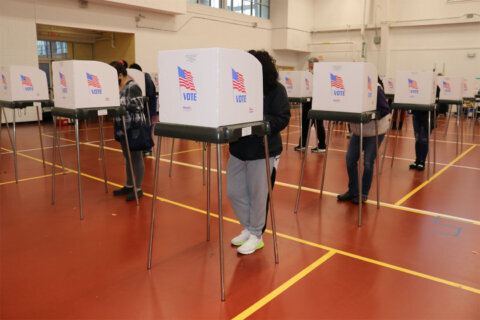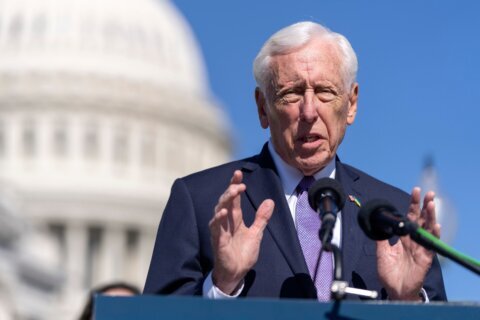Maryland has a presidential primary in less than a month. Early voting starts May 2.
When election judges report for duty on May 14, a new law that penalizes anyone who issues threats against them will be in effect.
Maryland Gov. Wes Moore has signed into law a bill that raises the penalty from one to three years in prison for anyone who issues a threat against an election judge. Under the same law, the fines for issuing threats in writing, online or in person increase from $1,000 to $2,500. The increased penalties apply if the family of an election worker is targeted, as well.
Jared DeMarinis, Maryland state administrator of elections, told WTOP incidences of harassment and threats directed at election judges and election workers have increased nationally.

“They’re designed to intimidate, they’re designed to cause a little bit of chaos or disruption in the process,” DeMarinis said.
DeMarinis said Maryland hasn’t seen the number of cases seen in other states, but there have been documented incidents of threats against election workers.
“The governor had our back. The general assembly had our back,” DeMarinis said of the penalties. “They understand the value of the work we do in a nonpartisan fashion.”
During a hearing on the legislation, Ruie Lavoie, the vice president of the Maryland Association of Election Officials and director of the Baltimore County Board of Elections, said he received a threat during the 2022 election cycle.
“I now place the safety of my staff, election judges, my board and our families first when establishing policies and procedures in my office,” Lavoie said.
Disinformation
The state’s Board of Elections has long had a feature on its website called “Rumor Control,” dedicated to fighting inaccurate information.
There are plans to expand the feature. Under the passed legislation, the board will be required to maintain a portal on its website so members of the public can report election disinformation.
DeMarinis has, among his priorities, focused on establishing faith in the state’s election process.
“We will give you — in a nonpartisan, open and transparent fashion — the correct information (on election operations),” DeMarinis said.
The effort to clear up any confusion among voters will include providing clarification in other languages.
“Disinformation is not just English-only,” DeMarinis said, adding that the board will search the internet for misinformation in other languages, including Spanish, “to help correct the record.”
Recruiting election judges
The job of election judges, said DeMarinis, is to administer election law in “a nonpartisan fashion.” He stated that there are election judges from each party, “so that no one side is tipping the scale — everyone is equally represented.”
The state and local boards of elections are recruiting election judges, and DeMarinis said anyone 16 or older is eligible.
“I would like to see more young people engaged,” he said. “I think that they are historically underrepresented.”
Election judges must be registered to vote, able to work a 15-hour day and will get paid training ahead of Election Day. Election judges earn between $250-$350 depending on the jurisdiction.
Get breaking news and daily headlines delivered to your email inbox by signing up here.
© 2024 WTOP. All Rights Reserved. This website is not intended for users located within the European Economic Area.








